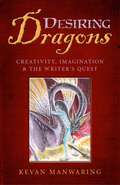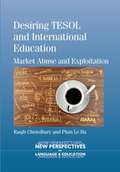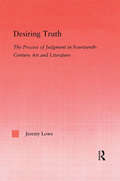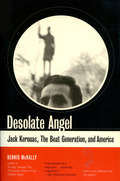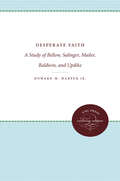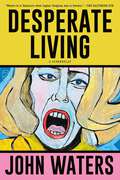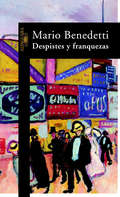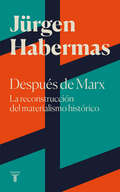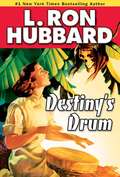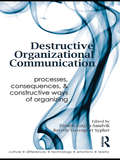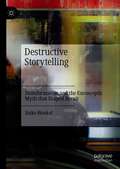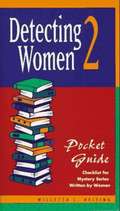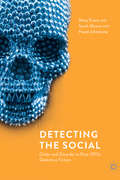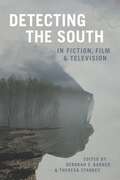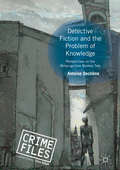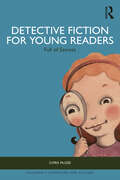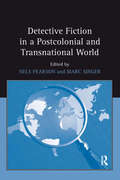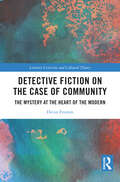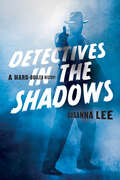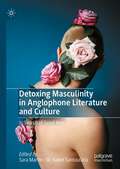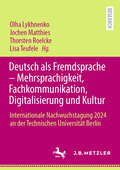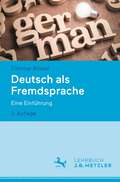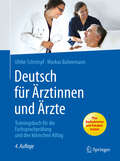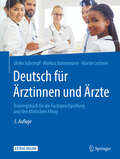- Table View
- List View
Desiring Dragons: Creativity, Imagination and the Writer's Quest
by Kevan ManwaringAuthor of The Hobbit, JRR Tolkien, talked of 'desiring dragons'; that he would prefer 'a wilderness of dragons' to the bleak territory of the unimaginative critic. The genre of Fantasy (including Science Fiction and its various sub-genres in TV, film & computer games) has never been more popular. This book seeks to examine why this might be and why so many are tempted to write Fantasy fiction. Tolkien suggested how "consolation" is an important criteria of the Fairy Tale: we look at how writing Fantasy can be consoling in itself, as well as a portal to Fantastic Realms for the reader. Along the way famous dragons of myth, legend and fiction will be encountered - from Grendel to Smaug. The riddles of dragons will be tackled and their hoard unlocked.
Desiring TESOL and International Education
by Raqib Chowdhury Le Ha PhanThis book addresses how Western universities have constructed themselves as global providers of education, and are driven to be globally competitive. It examines how the term 'international' has been exploited by the market in the form of government educational policies and agencies, host institutions, academia and the mass media. The book explores matters relating to the role of the English language in international education in general and the field of TESOL in particular. It demonstrates how English and TESOL have exercised their symbolic power, coupled with the desire for international education, to create convenient identities for international TESOL students. It also discusses the complexity surrounding and informing these students' painful yet sophisticated appropriation of and resistance to the convenient labels they are subjected to.
Desiring Truth: The Process of Judgment in Fourteenth-Century Art and Literature (Studies in Medieval History and Culture #30)
by Jeremy LoweFirst published in 2005. Routledge is an imprint of Taylor & Francis, an informa company.
Desolate Angel: Jack Kerouac, The Beat Generation, And America
by Dennis McNally"A blockbuster of a biography . . . absolutely magnificent."--San Francisco ChronicleJack Kerouac--"King of the Beats," unwitting catalyst for the '60s counterculture, groundbreaking author--was a complex and compelling man: a star athlete with a literary bent; a spontaneous writer vilified by the New Critics but adored by a large, youthful readership; a devout Catholic but aspiring Buddhist; a lover of freedom plagued by crippling alcoholism.Desolate Angel follows Kerouac from his childhood in the mill town of Lowell, Massachusetts, to his early years at Columbia where he met Allen Ginsberg, William S. Burroughs, and Neal Cassady, beginning a four-way friendship that would become a sociointellectual legend. In rich detail and with sensitivity, Dennis McNally recounts Kerouac's frenetic cross-country journeys, his experiments with drugs and sexuality, his travels to Mexico and Tangier, the sudden fame that followed the publication of On the Road, the years of literary triumph, and the final near-decade of frustration and depression. Desolate Angel is a harrowing, compassionate portrait of a man and an artist set in an extraordinary social context. The metamorphosis of America from the Great Depression to the Kennedy administration is not merely the backdrop for Kerouac's life but is revealed to be an essential element of his art . . . for Kerouac was above all a witness to his exceptional times.
Desperate Faith: A Study of Bellow, Salinger, Mailer, Baldwin, and Updike
by Howard HarperThis book traces the developing view of the human conditions through the major works of these five writers. The method is inductive, and the works are seen as a record of human experience not as an illustration of philosophical theory. A final chapter places them in the larger perspective of traditional American fiction.Originally published in 1967.A UNC Press Enduring Edition -- UNC Press Enduring Editions use the latest in digital technology to make available again books from our distinguished backlist that were previously out of print. These editions are published unaltered from the original, and are presented in affordable paperback formats, bringing readers both historical and cultural value.
Desperate Living: A Screenplay
by John WatersA grotesque and hilarious satire about the American dream, suburban living, and the corrupting influence of power, set in a world that could only have sprung from the unhinged and brilliant mind of John Waters.On the verge of a suburban mental health crisis, frazzled and wildly unstable housewife Peggy (immortalized by Mink Stole on-screen) runs away from home with her maid and partner in crime, Grizelda (played with spectacular gumption by the sizzling Jean Hill), only to end up in Mortville, a shantytown filled with society’s rejects. Mortville is run by the evil Queen Carlotta, who parades through the cardboard streets taunting and terrorizing her subjects.John Waters’ wild and visionary fable lampoons everything from the staid conservatism of the American dream to race and class relations. The New York Times ranked Desperate Living at “the highest peak atop [John Waters’] trash heap of a filmography.” High praise indeed!
Despistes y franquezas: 1990 (Biblioteca Mario Benedetti Ser. #Vol. 15)
by Mario BenedettiUn libro que resume los modos de escritura de Benedetti al tiempo que constituye una suerte de conversación privada entre el autor y sus lectores de siempre. En él se reúnen relatos, poemas, graffitis, viñetas varias sobre esos aspectos de la realidad que siempre han cautivado a Mario Benedetti y que han hecho de él uno de los escritores más leídos y admirados de las letras hispánicas. Despistes y franquezas es, así, el complemento indispensable para todo conocedor de la obra del autor de La tregua y el comienzo ideal para quien quiera adentrarse en su escritura y en su visión del mundo. Crítica, ternura, denuncia, pasión, amor e Historia aparecen en sus páginas como esas claves que muestran a un escritor en la pura verdad de su universo propio.
Después de Marx: La reconstrucción del materialismo histórico
by Jurgen HabermasLaobra decisiva que fijó las bases de la teoría de la acción comunicativa de Habermas.En este libro indispensable, Jürgen Habermas llevó a cabo una exhaustiva revisión de la teoría marxista del materialismo histórico, marco conceptualtan influyente en Europa que, aun siendo objeto de una revisión crítica profunda, sigue teniendo un indudable poder estimulante.Inscribiéndose en el movimiento de crítica del análisis marxista de la sociedad y profundizando al mismo tiempo en ese análisis, el libro (publicado originalmente en 1976) aprovechó las nuevas aportaciones de las ciencias sociales para recomponer la teoría con unespíritu renovador y así alcanzar mejor la meta que esta se marcó, teniendo en cuenta el contexto de finales del siglo XX-totalmentetransformado por el capitalismo-. Este libro decisivo se propuso fundarunapolítica enraizada en el lenguaje, capaz de liberarnos de los engaños de la ideología, que obstaculizan la comunicación libre.
Destiny's Drum
by L. Ron HubbardBuckle up for adventure. When former captain of this army and that, Phil Sheridan, lands on the shore of the forgotten Indonesian island of Kamling--jewel of the Banda Sea--he's captured instead of welcomed by warriors of a primitive and bloodthirsty tribe. Marched to the natives' camp, he meets José Emanuel Batista--one-time slave trafficker, long-time murderer, and now self-appointed tyrant. Using his smooth-talking tongue and shooting skills to escape, Sheridan finds temporary shelter at the lodgings of a miner and his beautiful daughter. With limited arms and supplies to hold off Batista and his men, Sheridan must take a desperate chance and journey ever deeper into the jungle. His plan? Enlist the help of headhunters who may be more interested in his head than in driving out Batista's regime and ending its tyrannical reign. "Primo pulp fiction." --Booklist
Destructive Organizational Communication: Processes, Consequences, and Constructive Ways of Organizing (Routledge Communication Series #Vol. 10)
by Pamela Lutgen-Sandvik Beverly Davenport SypherThis volume provides an in-depth consideration of destructive communication in organizations -- including workplace bullying, racism, stress, and harassment. It brings together communication scholars from theoretical and applied perspectives to assess current understandings, explore ways to integrate theory and practice, identify areas for change, and outline a research agenda for the coming decade. Each chapter examines a specific aspect of destructive organizational communication, reviews existing theory and research about that communicative form or ideology, suggests fruitful possibilities for application, and suggests key areas for further study. As such, the book opens a dialogue among communication scholars that explores destructive communication in organizations and addresses the following key components: the central issues and concerns regarding destructive organizational communication, current scholarly contributions to both applied and theoretical understanding of these issues, approaches to integrate applied/experienced and theoretical/conceptual perspectives in ways that inform one another and improve organizational considerations for varied stakeholders, and suggestions for a future research agenda for those interested in ameliorating the destructive side of organizational communication. Overall, the collection provides a basic understanding of the different types of destructive communication in organizations, the processes through which these interactions occur, the consequences to individuals and organizations, and the potential for organizing in more constructive, civil ways. This volume will be an excellent resource for scholars and researcher studying organizational communication, and graduate and advanced undergraduate students in organizational communication. It will also resonate with managers dealing with hostile workplaces, and organizational members trying to understand their current experiences. The book will serve as an excellent textbook for advanced undergraduate and graduate courses in organizational communication.
Destructive Storytelling: Disinformation and the Eurosceptic Myth that Shaped Brexit
by Imke HenkelThis book offers a new approach to understanding disinformation and its destructive impact on the democratic function of the news media. Using the notoriously false reporting of EU policies by the British press as a starting point, it utilises Critical Discourse Analysis to examine the linguistic properties of false news stories and to understand how they function as myth in Roland Barthes’ sense. The disinformation is essential for the impact these news stories had as it provides the simplification which creates the blissful clarity of myth that Barthes described. As myth, the false news stories depoliticised a political argument and naturalised the claim of antagonistic British-European relations. Henkel shows how news stories used disinformation to articulate a Eurosceptic myth of the feisty, witty Briton who stands up against the European bully. Her main argument is that the disinformation contributed to the Brexit vote because, as myth, it transported an ideology. Henkel argues that the Brexit debate and the news reporting that preceded it for decades can be understood as a case study for how political journalism becomes democratically dysfunctional. This book will be of interest to students and scholars of journalism, media and culture, political communication, and Critical Discourse Analysis.
Detecting Women 2: Pocket Guide Checklist for Mystery Series Written by Women
by Willetta L. HeisingIf you love the Fantastic Fiction website, you'll love Detecting Women 2. It's a small book of lists of series of women detectives with the authors and the books in the series. More than 600 series detectives created by women. Over 3400 mystery titles in correct series order.
Detecting the Social: Order And Disorder In Post-1970s Detective Fiction
by Mary Evans Hazel Johnstone Sarah MooreThis book analyses the ways in which twenty-first century detective fiction provides an understanding of the increasingly complex and often baffling contemporary world — and what sociology, as a discipline, can learn from it. Conventional sociological accounts of fiction generally comprehend its value in terms of the ways in which it can illustrate, enlarge or help to articulate a particular social theory. Evans, Moore, and Johnstone suggest a different approach, and demonstrate that by taking a group of detective novels, we can unveil so far unidentified, but crucial, theoretical ideas about what it means to be an individual in the twenty-first century. More specifically, the authors argue that detective fiction of the last forty years illuminates the effects of urban isolation and separation, the invisibility of institutional power, financial insecurity, and the failure of public authorities to protect people. In doing so, this body of fiction traces out the fault-lines in our social arrangements, rehearses our collective fears, and captures a mood of restless disquiet. By engaging with detective stories in this way, the book revisits ideas about the promise and purpose of sociology.
Detecting the South in Fiction, Film, and Television (Southern Literary Studies)
by Ace Atkins Megan Abbott Greg Herren Phoebe Bronstein James A. Crank Suzanne Leonard Scott Romine Harriet Pollack Gina Caison Riche Richardson Zackary Vernon Jacob Agner R. Bruce Brasell Claire Cothren Dominiqua Dickey Leigh Anne Duck Bob Hodges Sarah Leventer Kristopher Mecholsky Yajaira M. Padilla Jacqueline Pinkowitz Randall WilhelmDetecting the South in Fiction, Film, & Television, edited by Deborah E. Barker and Theresa Starkey, examines the often-overlooked and undervalued impact of the U.S. South on the origins and development of the detective genre and film noir. This wide-ranging collection engages with ongoing discussions about genre, gender, social justice, critical race theory, popular culture, cinema, and mass media. Focusing on the South, these essays uncover three frequently interrelated themes: the acknowledgment of race as it relates to slavery, segregation, and discrimination; the role of land as a source of income, an ecologically threatened space, or a place of seclusion; and the continued presence of the southern gothic in recurring elements such as dilapidated plantation houses, swamps, family secrets, and the occult. Twenty-two critical essays probe how southern detective narratives intersect with popular genre forms such as neo-noir, hard-boiled fiction, the dark thriller, suburban noir, amateur sleuths, journalist detectives, and television police procedurals. Alongside essays by scholars, Detecting the South in Fiction, Film, and Television presents pieces by authors of detective and crime fiction, including Megan Abbott and Ace Atkins, who address the extent to which the South and its artistic traditions influenced their own works. By considering the diversity of authors and characters associated with the genre, this accessible collection provides an overdue examination of the historical, political, and aesthetic contexts out of which the southern detective narrative emerged and continues to evolve.
Detectionary: A Biographical Dictionary
by Otto Penzler Chris Steinbrunner Marvin LachmanThe book contains a list of authors, titles, and publication years for detective fiction.
Detective Fiction and the Problem of Knowledge: Perspectives on the Metacognitive Mystery Tale (Crime Files)
by Antoine DechêneThis book establishes the genealogy of a subgenre of crime fiction that Antoine Dechêne calls the metacognitive mystery tale. It delineates a corpus of texts presenting 'unreadable' mysteries which, under the deceptively monolithic appearance of subverting traditional detective story conventions, offer a multiplicity of motifs – the overwhelming presence of chance, the unfulfilled quest for knowledge, the urban stroller lost in a labyrinthine text – that generate a vast array of epistemological and ontological uncertainties. Analysing the works of a wide variety of authors, including Edgar Allan Poe, Jorge Luis Borges, and Henry James, this book is vital reading for scholars of detective fiction.
Detective Fiction for Young Readers: Full of Secrets (Children's Literature and Culture)
by Chris McGeeDetective Fiction for Young Readers is an examination of contemporary mystery stories for children and young adults. This volume explores how the conventions, rules, and expectations of adult mystery fiction have filtered down, so to speak, especially in the past several decades, to writing for younger readers. The book is organized into three sections that explore the whodunit, the hardboiled, and the metaphysical styles of mystery fiction. Furthermore, this text analyzes how each style has been adapted for a younger audience, acknowledging and exploring representative novels most in keeping with that style. This volume is ideal for students, academics, and readers interested in children’s mystery fiction that adheres to formulas made popular after the golden age of classic detective fiction.
Detective Fiction in a Postcolonial and Transnational World
by Nels PearsonTaking up a neglected area in the study of the crime novel, this collection investigates the growing number of writers who adapt conventions of detective fiction to expose problems of law, ethics, and truth that arise in postcolonial and transnational communities. While detective fiction has been linked to imperialism and constructions of race from its earliest origins, recent developments signal the evolution of the genre into a potent framework for narrating the complexities of identity, citizenship, and justice in a postcolonial world. Among the authors considered are Vikram Chandra, Gabriel GarcÃa Márquez, Michael Ondaatje, Patrick Chamoiseau, Mario Vargas Llosa, Suki Kim, and Walter Mosley. The essays explore detective stories set in Latin America, the Caribbean, India, and North America, including novels that view the American metropolis from the point of view of Asian American, African American, or Latino characters. Offering ten new and original essays by scholars in the field, this volume highlights the diverse employment of detective fictions internationally, and uncovers important political and historical subtexts of popular crime novels.
Detective Fiction on the Case of Community: The Mystery at the Heart of the Modern (Literary Criticism and Cultural Theory)
by Devin FrommDetective Fiction on the Case of Community uses one of the most popular forms of modern literature to examine one of modernity’s most trenchant problems. The project rests on the argument that detective fiction emerges specifically from an awareness of the stress that modernization puts on the possibilities of communal life, as industrialization and urbanism accelerate the alienation and atomization we recognize as modern conditions. Here the detective appears as an image of thinking still able to perceive the threads that link such alienated people together, and therefore able to imagine solutions along the lines of these obscured connections. Reading the genre’s journey, from its origins in Poe to its most unorthodox form in Pynchon, allows fresh perspectives on the possibilities and limits of modern community, from its endurance as part of modernization to its meaning today as a sticking point in theoretical debate and political activism.
Detectives in the Shadows: A Hard-Boiled History
by Susanna LeeA century of American history reflected in the iconic private eye.Steadfast in fighting crime, but operating outside the police force—and sometimes even the law—is the private detective. Driven by his own moral code, he is a shadowy figure in a trench coat standing on a street corner, his face most likely obscured by a tilted fedora, a lit cigarette dangling from his hand. The hard-boiled detective is known by his dark past, private pain, and powers of deduction. He only asks questions—never answers them. In his stories he is both the main character and the narrator.America has had a love affair with the hard-boiled detective since the 1920s, when Prohibition called into question who really stood on the right and wrong side of the law. And nowhere did this hero shine more than in crime fiction. In Detectives in the Shadows, literary and cultural critic Susanna Lee tracks the evolution of this truly American character type—from Race Williams to Philip Marlowe and from Mike Hammer to Jessica Jones. Lee explores how this character type morphs to fit an increasingly troubled world, offering compelling interpretations of The Wire, True Detective, and Jessica Jones. Suddenly, in the present day, the hard-boiled detective wears his—or her—fatigue outwardly, revealing more vulnerability than ever before. But the detective remains resolute in the face of sinister forces, ever the person of honor. For anyone interested in crime fiction and television, or for those wanting to understand America's idolization of the good guy with a gun, Detectives in the Shadows is essential reading.
Detoxing Masculinity in Anglophone Literature and Culture: In Search of Good Men
by Sara Martín M. Isabel SantaulàriaThis edited volume rethinks Masculinity Studies by breaking away from the notion of the perpetual crisis of masculinity. It argues that not enough has been done to distinguish patriarchy from masculinity and proposes to detox masculinity by offering a collection of positive representations of men in fictional and non-fictional texts. The editors show how ideas of hegemonic and toxic masculinity have been too fixed on the exploration of dominance and subservience, and too little on the men (and the male characters in fiction) who behave following other ethical, personal and socially accepted patterns. Bringing together research from different periods and genres, this collection provides broad, multidisciplinary insights into alternative representations of masculinity.
Deutsch als Fremdsprache – Mehrsprachigkeit, Fachkommunikation, Digitalisierung und Kultur: Internationale Nachwuchstagung 2024 an der Technischen Universität Berlin
by Olha Lykhnenko Jochen Matthies Thorsten Roelcke Lisa TeufeleDie internationale Nachwuchstagung Deutsch als Fremdsprache, die im Januar 2024 an der Technischen Universität Berlin stattfand, bot jungen Forschenden eine Plattform zur Präsentation ihrer Arbeiten sowie zur Vernetzung. In dem vorliegenden Band werden Beiträge aus den Themenbereichen Mehrsprachigkeit, Fachkommunikation und Wissenschaftliches Schreiben, Professionalisierung und Digitale Medien sowie Kultur und Literatur veröffentlicht. Sie spiegeln das vielfältige Interesse der Teilnehmenden und die große Bandbreite ihrer Forschung im Bereich Deutsch als Fremdsprache wider.
Deutsch als Fremdsprache: Eine Einführung
by Dietmar RöslerDieser Band informiert über alle relevanten Bereiche des Fachs Deutsch als Fremdsprache – von den Lernenden über die Lehr- und Lernformen bis hin zu den produktiven und rezeptiven Fertigkeiten. Im Zentrum der Einführung stehen die Lerngegenstände Sprache, Literatur und Landeskunde. Weitere Kapitel widmen sich den Lehrmaterialien und Medien, vom gedruckten Lehrwerk bis zum Internet, sowie den verschiedenen Konzepten der Fremdsprachenvermittlung. Im zweifarbigen Layout: Mit Definitionen, Beispielen und vielen Abbildungen. Für die 2. Auflage wurde der Band komplett durchgesehen, aktualisiert und u.a. um Abschnitte zum Einsatz digitaler Medien, zum neuen europäischen Referenzrahmen und zum zweisprachigen Sachfachunterricht ergänzt.
Deutsch für Ärztinnen und Ärzte
by Ulrike Schrimpf Markus BahnemannDieses Buch ist ein Kommunikationstrainer, mit dem Sie sich als ausländische Ärztin bzw. Arzt optimal auf Ihre praktische Tätigkeit in Deutschland und auf die geforderte Fachsprachprüfung vorbereiten können:Übungsaufgaben und Fallbeispiele bereiten auf Situationen im Klinikalltag vorAudio-Dateien zum Download mit Beispieldialogen trainieren Hörverständnis und AusspracheOnlinebasierter Vokabeltrainer hilft beim gezielten Lernen von FachbegriffenEntwickelt von der Charité International Academy Berlin, bewährt seit 3 Auflagen - einsetzbar für alle Sprachlevel ab B1.
Deutsch für Ärztinnen und Ärzte: Trainingsbuch für die Fachsprachprüfung und den klinischen Alltag
by Ulrike Schrimpf Markus Bahnemann Martin LechnerAls Arzt aus dem Ausland können Sie sich mit diesem Buch optimal auf die praktische Tätigkeit und die Fachsprachprüfung in Deutschland vorbereiten. Hintergrundwissen zum deutschen Gesundheitssystem und gezieltes Sprachtraining helfen Ihnen dabei: Aufgaben und Fallbeispiele zum Üben der Anamnese, klinischen Untersuchung, Patientenvorstellung, Aufklärung und Therapie, ärztlicher DokumentationAudio-Dateien zum Download mit Beispieldialogen trainieren Hörverständnis und AusspracheOnlinebasierter Vokabeltrainer hilft beim gezielten Lernen von FachbegriffenGrundvokabular mit englischen Übersetzungen zum Nachschlagen und erweitertes Vokabular für die wichtigsten ErkrankungenExtra: Großes Format zum effektiven Lernen und Üben.Entwickelt von der Charité International Academy Berlin, bewährt seit 4 Auflagen und einsetzbar für alle Sprachlevel ab B1. Die 5. Auflage wurde komplett gesichtet, überarbeitet und aktualisiert.
